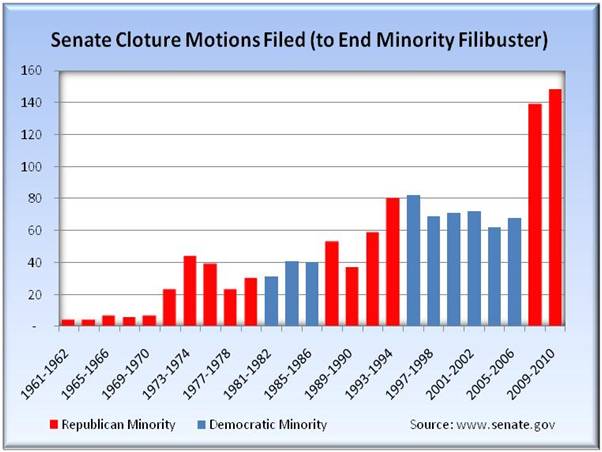What is a filibuster? In order to block a piece of legislation from coming to a vote, any Senator or group of Senators can talk for as long as they want about anything they want, effectively bringing the Senate to a halt.
To stop a filibuster, you have to invoke cloture (which requires a quick end to the debate), which requires 60 votes. What this means is that while you only need 51 votes to pass a piece of legislation, if a single Senator wishes to filibuster, you need 60 votes stop the filibuster and get it to the floor for a vote!
Why would anyone design a system like this? The word ‘filibuster’ does not appear in the Constitution. From the Dutch word for ‘pirate’, filibuster was first used to describe 'pirating' legislation in 1851.
The procedures adopted in In 1789 by the Senate allowed a debate on a bill to end by a simple majority vote requesting a “move to the previous question” (In other words that the bill that was being debated. In 1806 Aaron Burr observed that the “move to the previous question” had only been used once in the previous 4 years, and said the rule was redundant. The Senate agreed and got rid of the rule.
The potential for a filibuster was born, but it was not exercised for 31 years, when Henry Clay tried to stop debate on the establishing a second Bank of the United States.
Despite (or perhaps because of ) the tremendous power a filibuster could give a single Senator, the filibuster was used very infrequently.
In 1917, twelve Republican Senators blocked a bill that would have allowed merchant ships to arm themselves in the face of a German declaration of unlimited submarine warfare. A frustrated Woodrow Wilson backed a Democratic-majority Senate cloture rule, which allowed the Senate to stop debate on an issue if 2/3rds of those Senators voting agreed. (Amended to 3/5ths in 1975).
When the Senate invoked cloture against the filibuster of the 1964 Civil Rights Act, it was the only the second time cloture had been invoked since 1927.
In the 2009-2010 Senate there were 137 motions filed with 91 votes for cloture and 63 successful invocations of cloture.
What the hell happened?
In effect you need 60 votes to pass virtually anything in the Senate. It has made the business of a working government increasingly difficult.
Should we decrease the cloture majority to 55?
Should we limit the number of filibusters that either party can instigate in a year?
Should we go back to the rule of 1789?
Whichever side of the aisle you call home, one fact remains: The Founding Fathers never envisioned the Senate operating like this.
